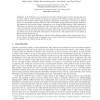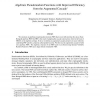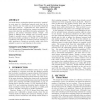CCS
2010
ACM
14 years 20 days ago
2010
ACM
Privacy is a huge problem for users of social networking sites. While sites like Facebook allow individual users to personalize fine-grained privacy settings, this has proven quit...
CCS
2010
ACM
14 years 20 days ago
2010
ACM
IPsec allows a huge amount of flexibility in the ways in which its component cryptographic mechanisms can be combined to build a secure communications service. This may be good fo...
CCS
2010
ACM
14 years 20 days ago
2010
ACM
We systematically study the design of image recognition CAPTCHAs (IRCs) in this paper. We first review and examine all IRCs schemes known to us and evaluate each scheme against th...
CCS
2010
ACM
14 years 20 days ago
2010
ACM
CCS
2010
ACM
14 years 20 days ago
2010
ACM
CCS
2010
ACM
14 years 20 days ago
2010
ACM
Cloud computing, as an emerging computing paradigm, enables users to remotely store their data into a cloud so as to enjoy scalable services on-demand. Especially for small and me...
CCS
2010
ACM
14 years 20 days ago
2010
ACM
We construct an algebraic pseudorandom function (PRF) that is more efficient than the classic NaorReingold algebraic PRF. Our PRF is the result of adapting the cascade constructio...
CCS
2010
ACM
14 years 20 days ago
2010
ACM
Tor, a distributed Internet anonymizing system, relies on volunteers who run dedicated relays. Other than altruism, these volunteers have no incentive to run relays, causing a lar...
CCS
2010
ACM
14 years 20 days ago
2010
ACM
Secure two-party computation allows two untrusting parties to jointly compute an arbitrary function on their respective private inputs while revealing no information beyond the ou...
CCS
2010
ACM
14 years 20 days ago
2010
ACM
A network latency estimation scheme associates a "position" to every peer in a distributed network such that the latency between any two nodes can be accurately estimate...



